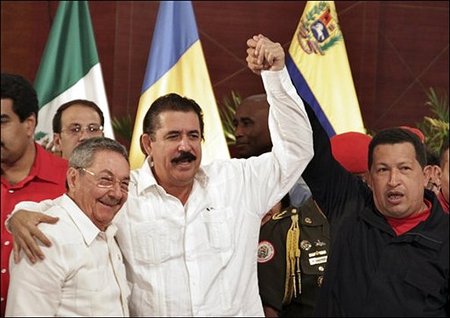
Caroline Esser is a research intern at the New America Foundation/American Strategy Program.
After reading this Council on Foreign Relations interview with Bernard Gwertzman, it struck me how strange and remarkable Honduran President Manuel Zelaya’s simultaneous relationships with both the United States and Venezuela truly were.
While in power, Zelaya managed to join the Hugo Chavez-led, Bolivarian Alternative for the Americas while preserving friendly relations with the United States and maintaining a steady flow of foreign aid from Washington.
The success of Zelaya’s balancing act partially explains the surprisingly similar responses of the United States and Venezuela to the recent political unrest in Honduras. In addition to both countries demanding Zelaya’s reinstatement in the name of democracy (a rather ironic statement coming from Chavez), both countries also levied economic sanctions against Honduras last week.
Venezuela’s announcement on Wednesday that it will cease the shipment of subsidized Venezuelan oil was followed a day later by the Obama administration’s announcement that the United States will place a hold on its $16.5 million military aid program.
Unsurprisingly, Chavez and Obama desire the reinstatement of Zelaya for quite different reasons. Chavez’ influence in Latin America would benefit from the return of a leftist ally who followed in his footsteps by trying to alter his country’s presidential term limit to extend his rule.
Obama, on the other hand, has no personal allegiance to Zelaya. As I discussed in an earlier post, Obama has made it clear that his interest is in the preservation of the democratic process rather than any one political leader. Obama acknowledged his ideological differences with Zelaya, stating last week that “America supports now the restoration of the democratically elected president of Honduras, even though he has strongly opposed American policies.”
It will be difficult for Honduras to maintain friendly relationships with both Washington and Caracas going forward. As Gwertzman notes in his interview, it seems unlikely that Zelaya will be able to maintain his relationship with Chavez and reclaim the presidency seeing as “a good part of the Honduran elite and those supporting Micheletti live in absolute fear of Hugo Chavez“.
As negotiations between Zelaya and Roberto Micheletti continue, it will be worth keeping an eye on whether the Obama administration can score a strategic victory by creating some distance between Honduras’ new political regime and Caracas.
— Caroline Esser


17 comments on “Guest Post by Caroline Esser: Zelaya, Chavez, and the United States”